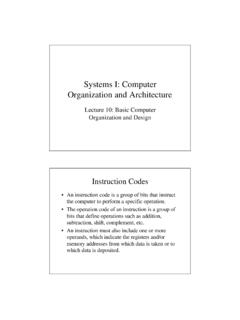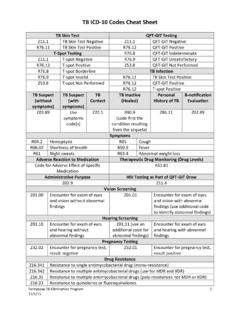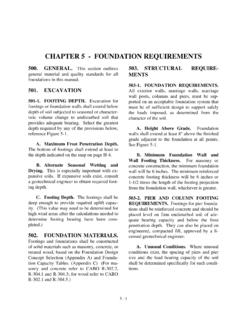Transcription of Codes of Professional Conduct and Ethics Education for ...
1 Philosophical Inquiry in Education , Volume 24 (2017), No. 4, pp. 323-347 Codes of Professional Conduct and Ethics Education for Future Teachers BRUCE MAXWELL Universit du Qu bec Trois-Rivi res Abstract: This paper argues that the way future teachers are being initiated into the ethical dimensions of their future profession is largely out of step with the movement to professionalize teaching. After recalling the role that Codes of Professional Conduct play in the ecology of Professional self-regulation, and arguing that familiarizing students with their local code of Ethics should be considered as the bare minimum of an adequate Ethics Education for professionals, the paper presents research findings indicating that Education students are not leaving colleges and universities with a clear understanding of what is expected of them by society, their peers and the profession.
2 The paper concludes with three suggestions about how to begin bringing Ethics Education for teachers more into line with teaching s aspiration to Professional status. Introduction This paper s central theme is the relationship between how educators are initiated into the ethical dimensions of teaching in preservice teacher formation and the movement to professionalize teaching. There is evidence that Education students are not leaving colleges and universities with a clear understanding of what is expected of them by society, their peers and the profession. This situation, I will argue, is not in the interest of trust between the public and the teaching profession and is a missed opportunity to promote quality teaching and professionalism in initial teacher Education . Not least, it is unfair to students and arguably neglectful.
3 My plan for the paper is to begin by recalling the role that a publicly promulgated code of Professional Conduct plays in the ecology of Professional self-regulation, which includes standing as the basis of the Education of the next generation of practitioners. Taking these observations as grounds, I then argue that familiarizing students with the collective norms of the teaching profession as articulated in the local code of Ethics that they will be held accountable to when they assume their Professional function is the bare minimum of an adequate Ethics Education for future teachers. Recognizing that this suggestion may be controversial, the paper then defends the notion of a code of Ethics against one of the charges that Codes of Ethics routinely face namely, that they represent a crass, reductionist view of professionals ethical obligations towards the people they help and serve.
4 With that objection out of the way, I turn to the evidence from a small body of empirical research some of which I gathered in a survey of Ethics Education for future teachers in collaboration with teacher educators in Australia, England, the Netherlands, and the USA which suggests that even this bare threshold is rarely being achieved. The paper concludes with three suggestions about how to begin bringing Ethics Education for 324 Philosophical Inquiry in Education teachers more into line with teaching s aspiration to Professional status. These are: consciousness-raising about how Codes of Ethics are used to judge allegations of teacher misconduct, appreciating that Ethics Education is part of the core work of Professional formation rather than a frill, and working towards a more cohesive and less divisive scholarly discourse about what matters most in teaching and learning about the ethical dimensions of teaching.
5 Before proceeding, let me underline the conditional character of this paper s argumentative approach. The claim is that if one is committed to the movement to professionalize teaching and if one accepts that an essential strategy for professionalizing teaching is to change the institutional framework of teaching and teacher Education so that it comes to resemble more closely that of legally recognized professions like law, medicine, dentistry and accounting, then it is imperative to be rigorous and explicit about introducing future educators to the ethical norms of teaching as they are formalized in existing Codes of Professional Conduct . Clearly, there are large underlying normative, sociological and even ideological questions about whether teaching is a profession and whether it should aspire to Professional status.
6 While I have addressed some of these more fundamental issues elsewhere (see Maxwell, 2015), in the interest of economy of space, I have strategically avoided them here. For the same reason, I will also have little to say in this paper about the various hypothetical explanations that one may advance to account for why teacher Education tends to take a somewhat improvised approach to socializing successive generations of teachers into the ethical norms of practice. As I point out below, speculating about this question is something of a cottage industry in the academic writings on Ethics content in teacher Education . Explanations vary, and one could go so far as to suggest that it is symptomatic of a general cultural mood of distrust towards teachers. Teachers are to passively adhere to curricular guidelines, unquestionably obey ever-shifting educational policy, and blithely work towards achieving performance targets they have little or no say in defining.
7 On this view, the neglect of Ethics Education which, among other things, should invite teachers to reflect on the wider purposes of Education and develop autonomous judgement dovetails neatly with this disdainful ideal of the teacher. In this paper, however, I am interested less in dwelling on such contextual explanatory factors, however plausible they may be, than in developing a normative case. Teacher educators tend to take a favorable view of the movement to professionalize teaching (Tardif & Gauthier, 1999). It may be na ve, but I genuinely believe that, if these same people appreciated just how incompatible a muddling-through approach to Ethics Education is with the project to elevate teaching s Professional status, they would be much less inclined to accept the status quo. Professional Status and Codes of Conduct Be it in teaching or any other profession, Codes of Ethics exist for at least two interrelated reasons: to reinforce public trust in the profession and guide Professional Conduct (Abbott, 1988; Banks, 2003; Sockett, 1990).
8 The way that Codes of Ethics reinforce public trust is by setting forth publicly and explicitly the ethical standards that people can expect a group of professionals to adhere to in their relations with them. In this sense, a code of Professional Conduct acts as a kind of pact between a group of professionals who, by their very nature, provide a particularly important public service like health care, Education , or legal advice (Carr, 2000) and those who rely on their services. In exchange for the right to Bruce Maxwell 325 Professional autonomy that is, the right to exercise the expert skills and specialized knowledge that define competent Professional practice with a minimum of interference from outsiders (Carr, 2000; Legault, 2006) professionals promise to put their Professional skills to use in the best interest of the public and in respect of high standards of ethical Conduct (Dunbar, 2000).
9 The code of Ethics is the key public statement of that promise. Of course, for a code of Professional Conduct to provide reliable assurances to the public about the trustworthiness of a profession, the Conduct of professionals must be more or less consistent with the code . It is in this sense that Codes of Ethics are meant to guide or regulate Professional Conduct . The trustee institution that oversees a code of Professional Conduct provides guarantees that members of the profession will be held accountable to the standards laid out in the code . Measures to assure accountability to the code are taken upstream of contact between professionals and the public, in the form of Education provided to new members about the collective ethical norms of the profession, but also downstream in the event of allegations of Professional misconduct (Abbott, 1988; Banks, 2003).
10 The standard legal requirement for Professional bodies to put a code of Ethics into place, educate members in the content of the code , and establish a mechanism for disciplining members found in breach of it is a way that the law creates space for Professional autonomy (Abbott, 1988). Society can require publicly recognized professions to hold its members to high ethical standards but the profession itself must establish the ethical norms that govern their work and form the basis of the relationship of trust with society (Legault, 2006). The positive and constructive roles that a code of Professional Conduct is meant to play in Professional life are clear: inspire public confidence, guide Professional Conduct , introduce new members to the ethical norms of the profession, and operate as a standard to assess the legitimacy of allegations of Professional misconduct.
















